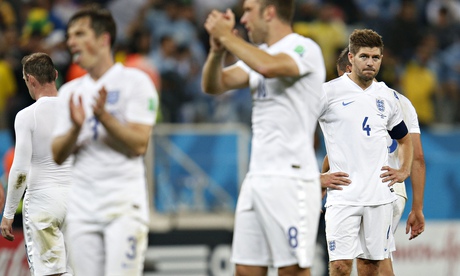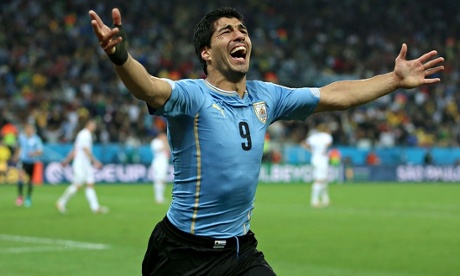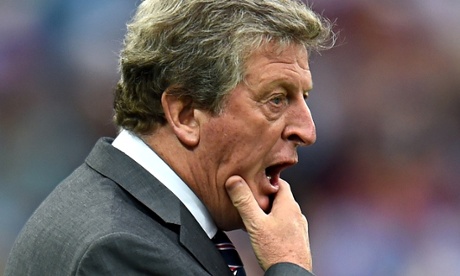England have a 72-strong entourage with them in Brazil, including a psychiatrist, nutritionists and a turf specialist. The only thing they do not have are any World Cup points

Steven Gerrard and dejected England team-mates after the defeat to Uruguay. Photograph: Tom Jenkins for the Guardian
Ultimately it always comes back to the same thing. When Roy Hodgson and his players arrived back in Rio de Janeiro it was to the best training facilities in the city. They have a 72-strong entourage from the Football Association including a psychiatrist, nutritionists, a turf specialist, a cook and at least one guy whose job seems to be to spray the players with water when they start overheating. They have industrial fans, heat chambers and individually tailored recovery drinks after inviting scientists from Loughborough University to study their sweat patterns. Hodgson has talked to Sir Dave Brailsford and Lord Coe about how to co-ordinate a successful team and everyone is agreed: nothing more could have been done to create the right environment.
“No excuses,” Wayne Rooney had said. Steven Gerrard described it as the most meticulously planned operation he had known. Hodgson could scarcely have sounded more confident. “Anyone who thinks we can’t win the World Cup has to be barking up the wrong tree,” he said, two days before landing in Brazil.
Yet here we are, embarking on the inquest before a lot of the teams have even played a second game. England were the team that wanted to play like Spain and, eventually, they managed it. Except the headline in Marca on Thursday was “The End”. England have managed it even before they finished their week-long course of malaria tablets.
And this is what it all comes back to: if everything was arranged so meticulously, every box ticked and everyone approving, there is only one place to begin and that is with the football, the old-fashioned way. England’s World Cup has not unravelled because of injuries or fatigue or mutinies or disagreements or logistical nightmares.
It is purely an issue about how they have treated the ball and the now familiar story that seems to crop up every time they encounter decent opposition. Or, in Uruguay’s case, half-decent opposition, bearing in mind Oscar Tabárez’s side finished fifth in their qualifying group and required a play-off against Jordan just to be here. Uruguay, for all Luis Suárez’s gifts, really were no great shakes.

Luis Suárez celebrates his winning goal. Photograph: Mike Egerton/PA
It is an unforgiving business and a lot of people will inevitably campaign for Hodgson to go, including no doubt many of those who lapped up the performance against Italy and acclaimed his sense of adventure in doing exactly what had been asked of him and putting out a team of flair, skill and audacity.
That is just the way of the football world and, in fairness to Hodgson, he knows enough about his own industry and the impatience of modern-day life to understand that his suitability for the job is now a legitimate issue. Hodgson did not take offence at the questions. He just looked weary and sad, with his hands pressed into his pockets.
Old, too. He always seems to put on a few years after a bad performance. If it was up to him, he said, he would still be in charge at the European Championship in 2016, as his contract stipulates. But he did not pretend to be oblivious to the potential consequences. “That’s not in my hands,” he said. “It’s not my decision.”
For now the relevant people at the FA say sacking him is not in their thoughts, and they do have at least the basis of an argument to justify keeping him. Yes, it is a strange contradiction when so many people can be uplifted by a defeat but the performance against Italy was in many ways genuinely invigorating.
Watching England had become such a joyless experience, with football as dreary and monotonous as the beat of the band’s drum. In Manaus they felt like a team of modern thinking and it was actually exciting to see. England played like a side that seemed to want the world to look at them in a new way.
Watch the latest edition of our World Cup Show
The problem for Hodgson is that a lot of the old failings resurfaced against Uruguay and the volume will go up several notches if another defeat follows against Costa Rica in Belo Horizonte on Tuesday. Hodgson wants us to believe that England are significantly better now than when he was parachuted into the job before Euro 2012 and, if you remember that tournament, they absolutely are.
A third defeat, nonetheless, and any argument that England have advanced enough in the Hodgson era would seem increasingly flawed. Hodgson might be spared the turnip treatment but the weight of pressure against him would stray dangerously close to intolerable.
Alternatively, do we really want to get back into the realm of looking through the various English managers and trying to work out if any would be a notable upgrade? Harry Redknapp might have been a good fit before Euro 2012, when the team needed someone with quickly effective restorative powers, but that time has passed.
Steve Bruce has done a fine job at Hull City, to the point that Southampton had him on their list before Ronald Koeman’s appointment. Sam Allardyce is out there. Gareth Southgate is a popular FA man these days, in charge of the under-21s. Adrian Boothroyd has wangled a job with the under-20s. John Beck is part of the FA’s coaching strategy these days. OK, you get the point. It is a fairly uninspiring list.
We would also have to trust the FA to choose the right man and it is not easy having faith in an increasingly elusive chairman, Greg Dyke, when the best he has come up with so far to improve England’s chances at future tournaments is his half-baked plan to create a League Three.
A small thing, perhaps, but it has been remarkable how little Dyke has been around the England camp and how hands-off he is, particularly compared with his predecessor, David Bernstein.
Dyke believes there are not enough Englishmen playing in the Premier League and he would be correct. Unfortunately he would also like to think that what happened in São Paulo on Thursday strengthens the argument to take a sledgehammer to the current Football League structure. The England manager Roy Hodgson always seems to put on a few years after a bad performance – the game against Uruguay was no exception. Photograph: Shaun Botterill - Fifa/Fifa via Getty Images
The England manager Roy Hodgson always seems to put on a few years after a bad performance – the game against Uruguay was no exception. Photograph: Shaun Botterill - Fifa/Fifa via Getty Images
 The England manager Roy Hodgson always seems to put on a few years after a bad performance – the game against Uruguay was no exception. Photograph: Shaun Botterill - Fifa/Fifa via Getty Images
The England manager Roy Hodgson always seems to put on a few years after a bad performance – the game against Uruguay was no exception. Photograph: Shaun Botterill - Fifa/Fifa via Getty Images
Sir Trevor Brooking is leaving his position with the FA and that leaves Adrian Bevington and Alex Horne as the other decision-makers. Bevington is the former press officer who became so powerful he even helped Hodgson select one of the under-21 squads before Southgate’s appointment.
Horne is the general secretary who is probably very accomplished at parts of his job but also seems not to have particularly high requirements for the national team.
In February, speaking to the Times, he was asked what he considered would be an acceptable performance for Hodgson this summer. “Pass mark?” he said. “For me, personally, he’s done it by getting through that group.” In other words, Hodgson was effectively on bonus time, just for getting through a qualifying group featuring unremarkable opposition in the shape of Poland, Ukraine, Montenegro, Moldova and San Marino.
No matter that Montenegro, for a long time England’s rival for top spot, would have been the smallest nation to have reached a World Cup. Or that Ukraine, who eventually finished second, were eliminated in the play-offs.
Hodgson had other ambitions but his defence has been vulnerable, Steven Gerrard has suffered and the front players, despite all the encouraging build-up play, have managed only a goal in each game. “Results colour everything,” Hodgson said.
“We think we came here well-prepared. But we’ve failed. We’ve conceded four goals and scored two. We had really big hopes we were going to make the nation proud by going far in the tournament and we haven’t done that.”
Rooney was right: there were no excuses. But Hodgson, a proud, patriotic man who took exception recently when one journalist referred to him as not seeming particularly passionate, was mistaken. Nobody should have thought, realistically, that England might actually win this tournament. “I’m devastated,” he said. “I’m very low.” It was unmistakeable sadness on his face.
read more : http://www.theguardian.com/football/blog/2014/jun/20/england-brazil-entourage-world-cup-2014

Tidak ada komentar:
Posting Komentar